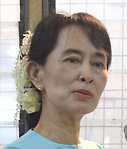More online
Aung San Suu Kyi, a Burmese human rights activist and Nobel Peace laureate, is the recipient of the 21st U-M Wallenberg Medal. In a rare public address overseas, Suu Kyi will give her videotaped Wallenberg Lecture at 7:30 p.m. Oct. 25 before an audience in Rackham Auditorium.
The lecture will be followed immediately by a live Q-and-A session with Suu Kyi in Burma.
Suu Kyi, freed from house arrest nearly a year ago, has not been expressly banned from leaving her country. However, she fears she may not be allowed to return if she goes abroad, so she continues to stay in Burma, devoting her life to the peaceful struggle for democracy and human rights.
She led her party to victory in the 1990 elections, but military leaders refused to recognize the results. She has spent most of the past two decades in jail or under house arrest.
Suu Kyi serves as the general secretary of the National League for Democracy, the leading opposition political party in Burma. In spite of efforts to suppress its activities, the party continues to meet, issue statements, and seek to engage with the opposition. The group refused to participate in a vote last year, insisting the election was held under unfair and undemocratic conditions.

Photo courtesy burmacampaign.org.uk.
Burma, with a population of 55 million, remains an isolated and impoverished country in turmoil. Human rights activists continue to be harassed, arrested and jailed. Attacks against ethnic populations have escalated, and grave human rights abuses against these populations have continued.
Thousands of democracy activists and ethnic leaders remain detained as political prisoners in Burma, notwithstanding the government’s refusal to acknowledge their existence. The Red Cross has not been allowed to visit the prisons of Burma since 2006.
Recently, the government has signaled a possible easing of repression, but the outcome remains highly uncertain. In August, Suu Kyi met with President Thein Sein. She was quoted in news reports saying that the two had “found areas of agreement” and that she remains “a cautious optimist.”
Suu Kyi has suggested that the United Nations conduct a fact-finding probe similar to the Truth and Reconciliation process spearheaded by Archbishop Desmond Tutu (also a Nobel Peace laureate and Wallenberg medalist) in South Africa after the abolition of apartheid.
Undaunted and fearless through many years of detention and efforts to intimidate her, in speaking out for democracy and human rights in Burma, Suu Kyi exemplifies the courage and commitment to the humanitarian values of Raoul Wallenberg, according to the Wallenberg Committee.
A 1935 graduate of the U-M College of Architecture, Swedish diplomat Raoul Wallenberg saved the lives of tens of thousands of Hungarian Jews near the end of World War II. In 1944, at the request of Jewish organizations and the American War Refugee Board, the Swedish Foreign Ministry sent Wallenberg on a rescue mission to Budapest. Over the course of six months, Wallenberg issued thousands of protective passports and placed many thousands of Jews in safe houses throughout the besieged city. He confronted Hungarian and German forces to secure the release of Jews whom he claimed were under Swedish protection, and saved over 80,000 lives.
After reporting to Soviet headquarters in Budapest on Jan.17, 1945, Wallenberg vanished into the Soviet Gulag. Although the Russians claim that Wallenberg died in 1947, the results of numerous investigations into his whereabouts remain inconclusive.

